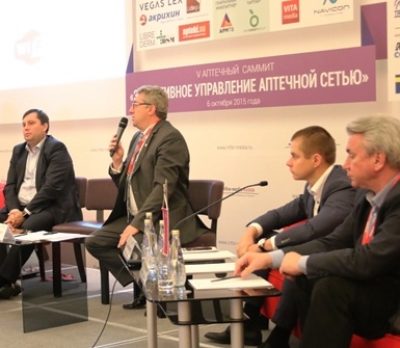The Seventh International Conference “What is the condition of the pharmaceutical market?” was held in Moscow. The event was co-organized be the ARPM and the AIPM. The two days conference brought together authorities, representatives of pharmaceutical and market analytical companies, professional unions and associations. The agenda of the conference included regulatory issues of state purchase, import substitution and other key topics of the industry.
Representative of the analytical companies spoke on the current situation on the pharmaceutical market and gave their forecast for 2016. According to Director General of DSM Group, Sergey Shulyak, pharmaceutical producers are trying to resist the price increase on medicines, however, due to the inflation it is not so easy to do. The price on the medicines from the List of Essential Drugs (ZNVLP) increased by 6.4%, and by 23% on other medicines in 2015. According to the forecast by DSM Group the total value of the market in the U.S. Dollars will drop to the index of 2009.
Acting Director of SPFO, Liliya Titova noted that the anti-crisis measures on fixing prices on medicines, support to local producers and the bill on “odd man out” were not implemented. She expressed her hope that the decisions on those issues would be made more promptly, with accordance to the demand of the current economic situation.
Speaking on the price increase, ARPM Director General, Victor Dmitirev noted that the dependence of the Russian pharmaceutical market on foreign substances implies dependence on the currency rates. The most vulnerable medicines are the ones from the lower market segment, as almost 90% of their pharmaceutical substrates are purchased overseas. Mr. Dmitriev said the state authorities are in a challenging situation. On one hand they are trying to support domestic companies and provide medicines for people, but on the other hand they are working on the compliance to the world standards. According to Mr. Dmitirev rejection of the price indexation of prices on the lowest market segment is a big mistake which led to disappearance of many medicines and their further replacement by much more expensive analogs. If we don’t support domestic companies the market will lose cheap segment of drugs, with are primarily purchased by hospitals.
This argument was supported by Director General of “Biotech”, Grigory Levicky. According to Mr. Levicky the value of production of medicines under 50 Rubles has decreased by 30%. “Biosythes” a daughter company of “Biotech” stopped producing 40 out of 70 drugs from the List of Essential Medicines. Mr. Levicky also shared his hope that the situation will be fixed shortly by the regulatory bodies.
Participants of the conference also discussed possible risks from the mutual drug market within the Eurasian economic union. The industry have shown its concern that there is no discussion on the standardization of the work or regulator bodies. Different opinions were expressed on the timeframe of the transition period to the new standards. Mr. Dmitirev said that Russia is ready to set up a two year transition period, however, with respect to other members a 5 year plan is considers. A head of regulatory department in Russia and the CIS countries, of “Besen Healthcare Rus”, Anna Solotickaya belives that the regulatory period should not take more than two years.
The other topic of the conference was the industry’s transition to GMP. Today a lot of companies with both 100% Russian capital (“Geropharm”, “Polysan”) as well as foreign localized in Russia companies (“Sanofi” and “Takeda”) work within the GMP standards. The goal of the regulators is to provide a prompt finish of the industry’s transition to the standards, and mandatory closing those factories that do not comply with the standards. According to the conference members there are a lot of manufactories who do not fit the standards. Head of department on quality control at “Bayer”, Olga Anokhina confirmed that they support the introduction of the new standards.
Head of the Federal State Institution “State Institute of Drugs and Good Practices”, Vladislav Shestakov spoke about the technical timeline of control procedures. According to him, the timeline for the verification should not be more than 210 days from the application, and should be stopped after identification щав the first critical observation. The main obstacle to with to the GMP standards is the lack of inspectorate. There are only 14 of them today.
Authorities and business discussed the issues of the domestic pharmaceutical industry as well as proposed measures to support it. Head of social and trade department of the FAS, Timothy Nigegorodcev said that today a foreign producer who localized in Russia receives greater support than a Russian one. The price registration became more strict and he proposed to change countries of reference to the ones that have similar to Russia system of phamra, primarily the BRICs countries. Moreover, the FAS began to create mechanisms to update the registry of medicines, in order to illuminate those medicines that are no circulating any longer. Finally, based on the Government’s order, the FAS together with ARPM members will design a new methodology for price registration by November 1, 2015.
Head of economics of healthcare at “R-Pharm”, Alexander Bikov noted that the import substitution should be export oriented. Cooperation with foreign companies should not only include transition of technologies to Russia, but also work experience. Russia has a unique chance to become a leader in cellular, and peptide biotechnologies. Import substitution is primarily an intellectual partnership.

